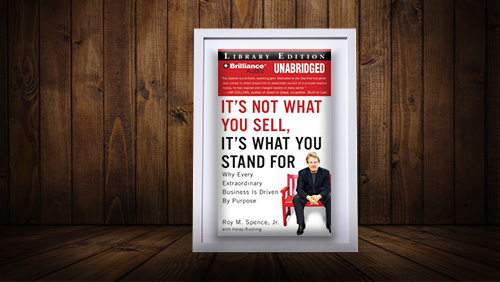In this week’s Pokerography series, Lee Davy takes a look at it’s Not What You Sell; It’s What You Stand For: Why Every Extraordinary Business is Driven by Purpose, by Roy Spence Jr, and suggests that poker players go seeking for a purpose.
 The first time I played poker in a casino was in Downtown Las Vegas. I was so clueless I kept buying the table drinks and paying the waitress completely unaware that the booze was free.
The first time I played poker in a casino was in Downtown Las Vegas. I was so clueless I kept buying the table drinks and paying the waitress completely unaware that the booze was free.
Back then, poker served a single purpose – to make easy money.
I’m not saying I was printing money. I’m saying, next to a mechanic or a waitress, playing poker as a job, if you can get it right, is a hell of a lot easier.
Then, one day, I quit the career that had paid the bills for 20-years. I felt compelled to distance myself from superiors. I wanted to work alone, but the change would need freedom and money. I decided to find both in poker.
My purpose for playing changed.
I needed to win, so I could form my company and help save people’s lives. It gave me the drive to succeed the likes of which I have never felt before. I studied harder; I played more, I started to look at poker as a business and not a game – all driven by purpose.
And I’m not alone.
Philipp Gruissem nearly quit poker at the peak of his powers because he had no purpose. Gruissem eventually founded Raising for Effective Giving (REG) a meta-charity that helps reduce suffering in the world. Gruissem returned to poker with a purpose.
Nick Maimone is another top notch poker player who nearly quit the game before he found purpose backpacking through Honduras. FU_15 earns money through poker and uses it to improve the impoverished lives of the Honduran children.
It’s purpose and not profits that drive the businesses that we love.
As a poker player, you are a business.
What you stand for is far more valuable than any all-in and call.
Why Have a Purpose?
 If poker is your central source of income, you have to run your life like a business. A company exists because of purpose, without one it dies. It’s much deeper than making money for nothing more than material wealth.
If poker is your central source of income, you have to run your life like a business. A company exists because of purpose, without one it dies. It’s much deeper than making money for nothing more than material wealth.
By uncovering purpose, you are telling the world you are ready to make a difference. Once you reach this point of clarity every action you take flows.
Purpose creates passion, and passion drives you through the endless hours sitting behind your computer or soaking up the body odour of the man sitting next to you in the casino.
With a purpose in situ, you can make quicker decisions and become more efficient. Presented with an opportunity to take an individual course of action you can question whether it’s aligned with your purpose and if it is, pursue it, and if it’s not, then drop it.
Every action that sits on your to-do-list should align with your purpose. If you have a choice of watching House of Cards or RunItOnce videos then your decision will be driven by purpose.
How do I Find Purpose?
Not everyone will feel compelled to create a non-profit or head to South America to start building schools. For most people, their purpose is invisible. It’s as complicated as a crossword in a posh newspaper. It’s a topic never before discussed.
The starting blocks of purpose lie beneath the core values drive your actions. In the book It’s Not What You Sell, It’s What You Stand For: Why Every Extraordinary Business is Driven by Purpose, the author Roy Spence Jr, explains that all of the visionary companies that he has worked with were driven by a core set of values.
When I played poker to make money, my values were very different to when I played the game as a way to earn money so I could create a company that would save lives. But I would never have noticed had I not done a values exercise.
The best reading material I have consumed on Values comes from Steve Pavlina. I urge you to read Living Your Values Part 1 and Part 2, before going through his List of Values and pulling out the ones that currently guide your decisions.
I find it’s easier to go through his list, write down the ones that you feel connected to, and then slowly chunk them down until you have ten core values. Once you have done this, let them sink in for a few days. Then return to them and ask if those values align with your purpose behind playing poker.
I am sure had Gruissem and Maimone done this exercise, Service and Philanthropy would have been high on their list and playing poker purely to earn money would not have aligned with these values hence the need for soul-searching and a change of direction.
It’s not easy to find purpose. It’s elusive. Ego also gets involved. With people building schools and non-profits, how can it not? You may feel compelled to out purpose the purposeful, or you may be driven to despair thinking your life is meaningless because you can’t find it.
It all comes back to what you love.
What are you passionate about?
Think about your childhood and make a list of the things that used to excite you until the Too Cool School made you give them up for a life of robotic tribalism.
What is it about poker that excites you outside of the money?
What do you like doing when you aren’t playing?
Who are your heroes in the world?
Why?
Is there a problem in the world that you can solve by taking action in a way that turns you on?
“Where your talents and the needs of the world cross, there lies your calling.” Aristotle
Purpose is almost always born out of a need that exists in the world. Find it by doing the exercises described above and when you do you will notice a freshness about your game.
The performance of great businesses prospers when their actions stem from a purpose with the power to make a difference and the passion that moves people.
You are a business.
You need a purpose.
Get to it.